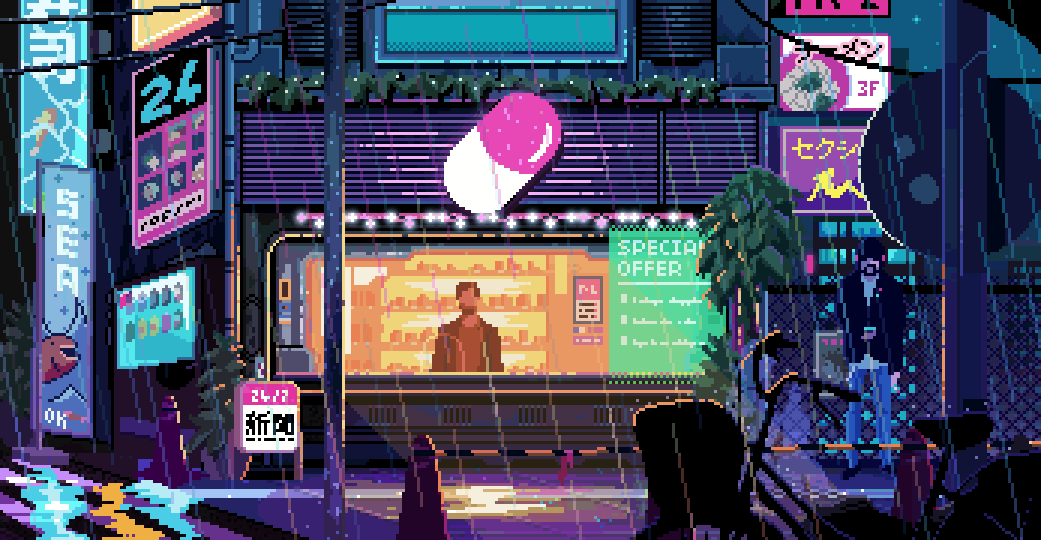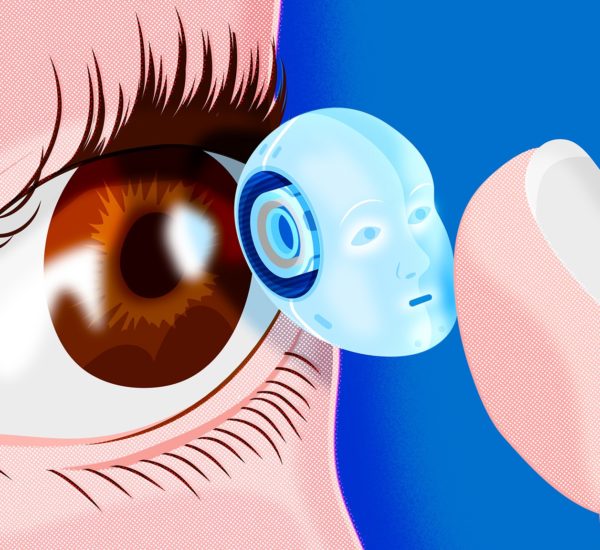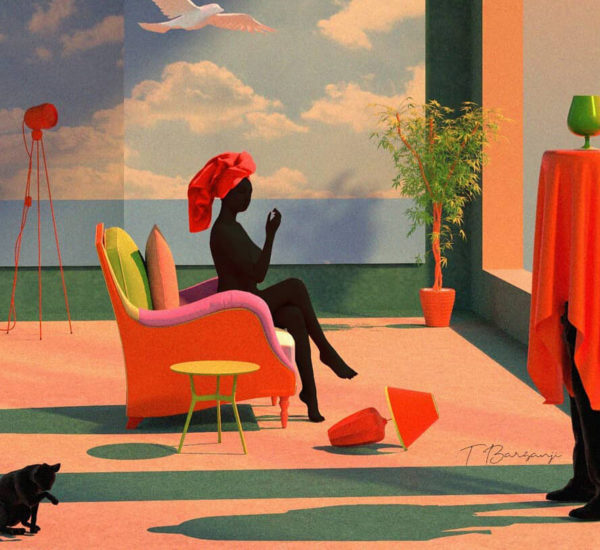Originally known as a record label housing retrowave and metal artists such as Perturbator and GosT, Blood Music is now delving into the realm of videogames with their new release, VirtuaVerse, a pixelated cyberpunk adventure game developed by Theta Division.
All tinted with the classic Miami Vice pink and blue tones, VirtuaVerse brings a futuristic story written by the chiptune/cyber-metal artist Master Boot Record, who also took care of the brilliant soundtrack encompassing the narrative and mechanics a game that will probably attract fans of LucasArts and Sierra games, such as Monkey Island and King’s Quest.
The aesthetics were developed after Valenberg’s signature style, the latest master of pixel art who already worked previously with other Blood Music artists. Now, he comes back to join Blood Music in this new challenge as a publisher of videogames, which turns to be a way to conciliate an old passion held by the team. “We were big on old PC games, particularly the Sierra stuff, and had an affinity for NES and Sega Mega Drive. K is the more modern game aficionado and has owned basically everything from SNES onward and plays a lot of both current blockbuster and indie games”, they tell. “As a group, the team has a respect and love for gaming and what it does, imaginative exploration and the creation of alternate worlds.”
In fact, as Blood Music team stresses, this connection between their music and videogame has started back ago when Perturbator and Dad Terminus had their music licensed as soundtrack for the games Hotline Miami and NeuroVoider. “Because of our overall appreciation for media and our desire to continually push the boundaries of the label, getting into games seemed like the next, great adventure.”
Futuristic nostalgia
With such a small team of 3 people, Theta Division has been proving to be a very skilled and talented game developing company. While Elder0010 takes care of the code and text, Victor (aka Master Boot Record) writes the story and Valenberg takes care of the graphics and animation. Together, they are developing a game set in a future not so far away where a single AI prevailed and governments have become obsolete.
In the world of VirtuaVerse, society is now migrating to a permanently augmented world managed by a global neural network. The protagonist, Nathan, is an outsider that refuses to comply with this new system, so he is making a living off the grid as a smuggler of pirate gadgets and cracked software. Waking up one day he finds out his girlfriend Jay disappeared overnight and broke his custom Augmented Virtual Reality glasses, leaving only a mysterious message on the bathroom mirror of the apartment. She’s an AR graffiti writer whose drones have been bit-spraying techno-color all over the augmented space in the city. Disconnected and determined to find out what happened to Jay, Nathan thus finds himself on an unexpected journey of technomancers, AR graffiti rebels, digital archeology, epic cyberwars, and virtual reality debauchery.
As big fans of classic adventure games, Theta Division think there’s still something special in pixel art, in spite of all the developments in 3D graphics over the past few years – and this would be the best way to tell the story designed for VirtuaVerse. Also, as they remind, it is the very fact that pixel art is less realistic that also makes it more artistic. “The limitation of the working framework and resolution really emboldens the imagination. At the same time, on a technical level, the final resolution of our game is very high even though it’s the result of multiplying the original 320×180 graphics by 6 times for the final output”, they explain. “This makes the game look modern and provides a different, sharper experience compared to classic games which weren’t made with modern displays in mind.”
Theta Division’s team also says that adventure games, in general, have never focused on realistic details, but they were rather driven by imagination and story, which makes the way they chose to render the narrative of VirtuaVerse a purely artistic decision. “The end look is all masterfully exalted by Valenberg’s unique style & palette that is well known in the pixel artist community.”
Back to the origins
Allied with the massive comeback of retro cyberpunk works in 2017, when Blade Runner 2049 was also released and included this very aesthetics in their color choices, Theta Division ended up conciliating an old passion for cyberpunk and retrogaming in this nostalgic zeitgeist.
With VirtuaVerse, a point and click adventure title, Theta Division is also bringing back the mechanics that marked a generation of gamers by adapting new narratives and aesthetics to it. “While modern games provide a different approach, even in their most realistic and successful forms, they sometimes still feel awkward and miss the mark in how the game plays,” they argue. “The point and click system is more effective for puzzle driven mechanics and story based games. At the same time, even if the core structure is very classic, we are also introducing some features that are fairly novel and will improve the classic point and click experience.”
But in spite of adopting a retro perspective for the mechanics and aesthetics of the game, VirtuaVerse is still portraying a future that is as close as possible to real outcomes when thinking about current and emerging technologies. Theta Division’s team says the themes envisioned in the game were never thought to be an exaggerated vision of the future, although many current sci-fi works sold as cyberpunk do so. “Cyberpunk has never been about the distant future, but rather analyzing the implication of emerging technologies and the accompanying impact of cultural mindsets that could lead to dystopian realities.”
The game is expected to be released in 2019, but you can keep an eye on the news by following them on Facebook and Instagram.




Depends of how cyberpunk2077 will make an impact in 2020.